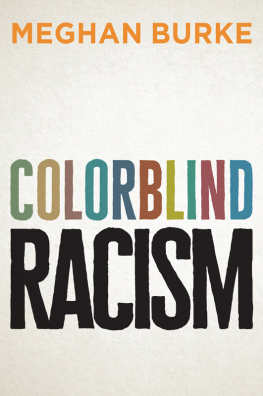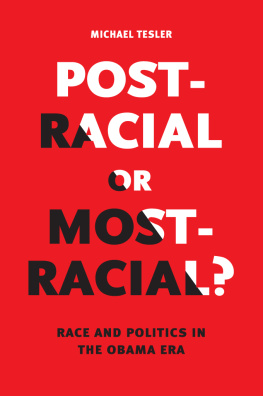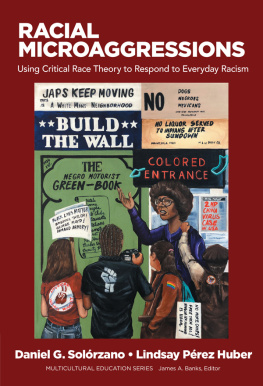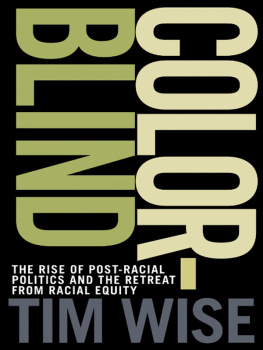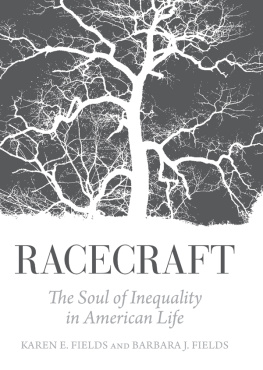About the Author
Dr. Melanie E. L. Bush is currently an associate professor of anthropology and sociology at Adelphi University (Garden City, NY) and was employed at Brooklyn College from 19902005. She obtained an undergraduate degree at McGill University in Montreal and advanced degrees at the City University of New York. Dr. Bush is coauthor of a forthcoming book entitled Tensions in the American Dream: Rhetoric, Reverie or Reality? (with Dr. Roderick D. Bush, St. Johns University), has published numerous articles in scholarly journals, and presented at a range of conferences, universities, and community settings both nationally and internationally. Dr. Bush has been active for over three decades in community struggles such as for full employment, education, womens rights, and against racism and academic projects for peace, justice, and the common good.
Acknowledgments
M any people made critical contributions, intellectually and spiritually, to the research and analysis that influenced this work. To acknowledge each and every one by name would not be realistic and to measure one persons role as more worthy of mention than another, impossible. So, as Tato Laviera beautifully stated, With every word I write, I give thanks to fifty people, and that is easily an underestimate!1 I express tremendous gratitude to all of you.
For this second edition, acknowledgement first goes to all those noted in the first edition. You continue to be the foundation and inspiration for everything I do. I reiterate very special and profound appreciation to Rod and Sarafina, Mom, Dad, Ethan, Aunt Honey and Alfreda Adams, Raj and Athena, and the Bush, Tillman, Craddock, Levine, Okome, Chin, Tenemas-Chavez, Grant, Culley, Lee, Starr, Parker, Walters, Forsh, Zhang, Patterson, Lopez, and Finch families.
To all the many colleagues, students, and friends at Adelphi University, thank you so much for your support. In particular, Donna Truong, Lakeisha John, Mashal Hamidi for your research assistance and general support, the entire Sociology and Anthropology Department, Muriel Herring, and all those who patiently listened to me talk endlessly about this project over the last year and a half, for your encouragement. To name you all would take the whole book! To all involved with the Adelphi Collaboration Project, for your inspiration. To students who were in classes with me over the period during which I worked on the second edition, I hope you see your thoughts, ideas, and generosity reflected in this revision.
Much appreciation goes to those at Brooklyn College and in CUNY who provided unending support with the original and revisit research by providing information, access to classes, and encouragement.
Great appreciation is given to the many scholars who have been incredibly generous with ideas, feedback, and references and who provided the theoretical frameworks within which my thinking developed. If there was one person to thank it would be Leith Mullings, whose scholarly insight and moral wisdom guided the analysis. She provides an extraordinary role model as an engaged intellectual. She challenged me when my thinking or writing was lazy and has been a life anchor in so many different ways. I owe significant intellectual debts to many people, including though not limited to Elizabeth (Betita) Martinez, Immanuel Wallerstein, James Jennings, Joe Feagin, Manning Marable, Robin D. G. Kelley, David Roediger, Rose Brewer, and Steve Steinberg.
Thanks to the CUNY Dispute Resolution Consortium, the Hewlett Foundation, and Adelphi University for grants that made the research possible.
To Sarah Stanton and everyone at Rowman & Littlefield Publishers for patience in the book revision!
To all acknowledged in the first edition and many more this time round, thank you for taking this project and my ideas seriously. To everyone who gave generously as participants, supporters, critics, and intellectual and spiritual boosters and friends, for knowing we can make a difference and that we must, I acknowledge you and express deep appreciation for your support. Much gratitude and respect for all those named and unnamed.
Thank you all, profoundly.
Afterword
T he events of September 11, 2001, and after have exacerbated the global economic and political reconfigurations that were underway for the previous thirty years and described throughout this book. Writing the initial draft of the manuscript during this period heightened my sensitivity to the ways in which daily events provided further evidence of my central arguments. Here I reflect on the meaning of this project as it relates to the present time and some of the most apparent connections between my conclusions and this juncture in world history.
As has been discussed in this study, the notion of race is and has been historically crafted, manipulated, reinforced, reproduced, and rearticulated to justify the presumed superiority of white people and to distract attention from the social arrangement that concentrates power and wealth in a very small percentage of the worlds population. The heightened instability of U.S. hegemony within the world capitalist system over the last two decades and the consequent vulnerability of western and white supremacy materially affect poor, working-, and middle-class people in concrete and everyday ways.
During times when ordinary people experience political and economic insecurity, ideology plays a critical role in shaping how they understand and interpret what they feel and where they place blame. Since the events of fall 2001, the structures of power have become more visible than they had been since the 1960s. Political leaders moved aggressively to dictate the terms of these interpretations, looking to justify the current social organization and their power within it. We have been told we are not at war with Islam, Muslims, Arabs, Afghanistan, or the Iraqi people, yet who is profiled, and who is bombed? Would the public reaction be the same if the suspects were British, French, or German?
Blatant war profiteering occurs in plain sight; Special Operations forces are deployed in seventy-five countries around the globe, up in number and budget from about sixty at the beginning of 2009.1 Corporate bailouts and tax rebates now appear routine. The 20 U.S. financial firms that have received the most bailout dollars from taxpayers awarded their top five executive officers, in the three years through 2008, pay packages worth a combined $3.2 billion. These 100 financial executives, on their way to driving the U.S. economy off a cliff, averaged $32 million each. One hundred U.S. workers making the 2008 annual average wage would have to labor over 1,000 years to make as much as these 100 executives made in three.2 These actions are being taken simultaneous to the layoff of ever-increasing numbers of poor, working-, and middle-class people and to tripled foreclosure rates from 2006 to 20083; roughly one in four households with children in the United States reported not having sufficient funds to purchase food in 2009.4
We live at a time when the governments primary constituency is corporate. Their interests are in direct contradiction to the interests of ordinary people in the US; increased profits are realized by showing the door to as many workers as possible, and squeezing the remainder to the bursting point. Productivity (based primarily on improvements in technology) is way up. Hiring, of course, is down. Part-time and temporary workers are in; full-time workers with benefits are out (Herbert 2003).
Despite the efforts to camouflage, disguise, and deny the implications of these events, the mainstream media have functioned to expose these contradictions, even if not willingly or deliberately. Many educators and activists struggle to bring to light the history of the United States foreign and economic policies that form the backdrop for recent events. Such policies enabled, for example, continuous interventions in the affairs of sovereign nations over the last one hundred years, recent support for Islamic fundamentalists, and economic partnerships between the Bush and the bin Laden and Hussein families.5
Next page

